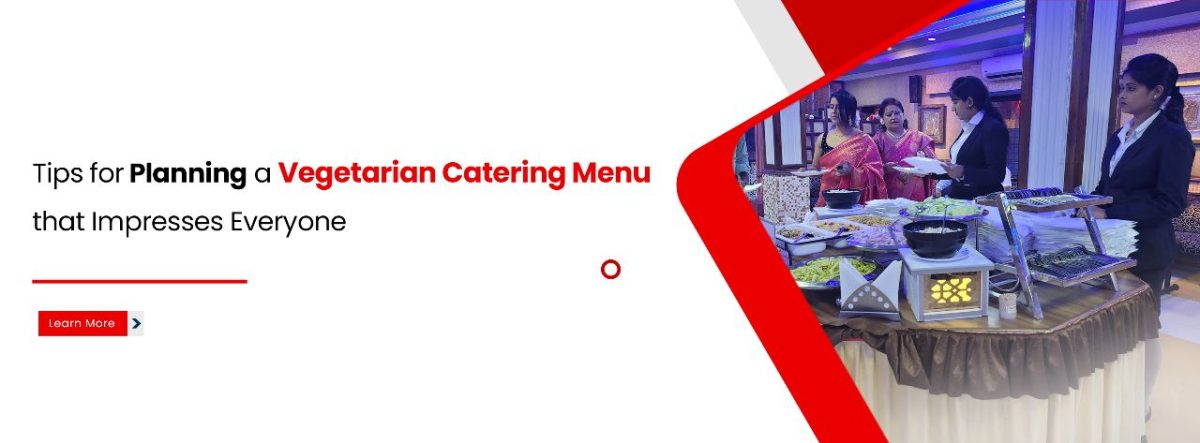Vegetarian catering is not just for vegetarians. More and more people are choosing to eat less meat or no meat at all for health, environmental, ethical, or personal reasons. Whether you are hosting a wedding, a corporate event, a cocktail party, a theme party or any other occasion, you can impress your guests with a delicious and diverse vegetarian menu that caters to everyone’s tastes and preferences.
But how do you plan a vegetarian catering menu that satisfies both vegetarians and meat-eaters alike? Here are some tips to help you create a mouth-watering and memorable vegetarian feast, with plenty of vegetarian catering menu ideas that will appeal to everyone.
1) Know your audience
Before you start planning your menu, you need to know who your guests are and what their dietary needs and preferences are. Some people may be vegan, meaning they avoid all animal products including eggs and dairy. Some may be lacto-ovo vegetarians, meaning they eat eggs and dairy but not meat. Some may have allergies or intolerances to certain foods such as gluten, nuts or soy. And some may be flexitarians, meaning they occasionally eat meat but prefer plant-based options.
To make sure you accommodate everyone’s needs, you can send out a survey or an RSVP card to your guests, asking them about their dietary restrictions and preferences. You can also ask them if they have any favorite vegetarian dishes or cuisines that they would like to see on the menu. These vegetarian catering menu ideas should reflect the diverse needs of your guests, making it easier to create a spread that pleases everyone.
2) Offer variety and balance
The key to plan a vegetarian catering menu that impresses everyone is to offer variety and balance. Avoid serving the same boring salads and sandwiches that guests have seen before. Instead, surprise and delight them with creative and delicious vegetarian dishes that showcase different flavours, textures, colours and nutrients.
A well-crafted vegetarian catering menu should include a mix of hot and cold dishes, appetizers, entrees, salads, soups, grains, legumes, fruits, vegetables, desserts, and beverages. Strive for a balance of protein, carbohydrates, fats, vitamins, minerals, and fiber in your vegetarian offerings. This ensures that your guests receive all the essential nutrients they need from their plant-based meals. These vegetarian catering ideas can include everything from hearty stews and salads to grilled vegetable platters and vibrant grain bowls.
Here are some examples of varied and balanced vegetarian dishes:
- Roasted vegetable and hummus wraps
- Quinoa salad with roasted beets, feta cheese, and walnuts
- Vegetable lasagna with spinach, mushrooms and ricotta cheese
- Lentil curry with coconut milk and basmati rice
- Grilled tofu skewers with peanut sauce
- Vegetable spring rolls with sweet chilly sauce
- Fruit salad with yogurt and granola
- Chocolate cake with whipped cream and berries
You can adapt these dishes based on the season and your guest preferences, ensuring your vegetarian catering menu ideas remain fresh and innovative.
3) Spice it up
One of the common misconceptions about vegetarian food is that it is bland and boring. This is far from the truth. Vegetarian food can be as flavourful and exciting as any other cuisine if you use the right spices and herbs. Spices and herbs can add depth, complexity, aroma and heat to your dishes. They can also enhance the natural flavours of the ingredients and create different regional or ethnic influences. Some of the spices and herbs that go well with vegetarian food are garlic, onion, ginger, turmeric, cumin, coriander, paprika, chili powder, cinnamon, cardamom, nutmeg, cloves, oregano, basil, thyme, rosemary, sage, parsley, cilantro and mint.
You can use spices and herbs in different ways to create different effects on your dishes. You can use them whole or ground as seasonings or marinades; you can toast them in a dry pan to release their oils and aromas; you can infuse them in oils, vinegars or syrups to make dressings or sauces; you can blend them with nuts, seeds or dairy products to make dips or spreads; or you can steep them in water, milk or juice to make teas or drinks.
Spices and herbs can also have health benefits for vegetarians. They can boost the immune system, fight inflammation, improve digestion, lower blood pressure, regulate blood sugar and prevent infections. They can also add antioxidants, phytochemicals and other nutrients to your diet.
4) Use seasonal and local ingredients
To make your vegetarian catering menu more impressive is to use seasonal and local ingredients as much as possible. Seasonal ingredients are fresher, tastier, more nutritious and more environmentally friendly than imported or out-of-season ones. Local ingredients are also more likely to support your community and reduce your carbon footprint.
To find out what ingredients are in season and available in your area, you can visit your local farmers’ market, grocery store, garden center or online sources. You can also ask your caterer for suggestions on what ingredients they can source locally and seasonally.
Using seasonal and local ingredients will also help you create a menu that reflects the theme, time and location of your event. For example, you can serve a warm and cozy menu with root vegetables, squash, mushrooms, and spices in the fall or winter. Or you can serve a light and refreshing menu with berries, citrus, melons and herbs in the spring or summer.
5) Add some flair and creativity
A tip for planning a vegetarian catering menu that impresses everyone is to add some flair and creativity. Flair means adding some extra touches that make your dishes more attractive and memorable. Creativity means adding some twists or surprises that make your dishes more unique and exciting.
Some ways to add flair and creativity are:
- Use fresh herbs, spices and sauces to enhance the flavour and aroma of your dishes
- Use edible flowers, fruits and vegetables to decorate your dishes and add some colour and contrast
- Use different types of plates, bowls, cups and utensils to present your dishes in an elegant and stylish way
- Use different types of garnishes such as nuts, seeds, cheese, croutons and sprouts to add some crunch and texture to your dishes
- Use different types of fillings such as cheese, veggies, fruits and nuts to add some variety and interest to your dishes
Adding flair and creativity will help you create a vegetarian catering menu that is not only delicious but also impressive and memorable. It will also help you showcase your skills and personality as a caterer.
6) Don’t forget dessert
No catering menu is complete without dessert. And just because you’re serving vegetarian food doesn’t mean you have to skimp on the sweet treats. There are plenty of vegetarian-friendly desserts that are decadent and delicious. Some examples are chocolate cake, cheesecake, brownies, cookies, pies, puddings, ice cream, sorbet, fruit salad and more. You can also make your desserts vegan or gluten-free by using substitutes like almond milk, coconut cream, flax eggs, oat flour or maple syrup.
7) Hire a professional caterer
Planning a vegetarian catering menu can be fun and rewarding, but it can also be challenging and time-consuming. If you want to save yourself some hassle and ensure that your menu is prepared and served with quality, care and professionalism, you may want to hire a professional caterer who specializes in vegetarian cuisine.
A professional caterer will have the experience, knowledge, equipment and staff to create a vegetarian menu that suits your budget, event and guests. They will also be able to handle the logistics of ordering, sourcing, storing, cleaning, cutting, cooking, presenting and serving the food. They will also be able to accommodate any special requests or last-minute changes that may arise.
If you are searching for a professional caterer that excels in crafting a vegetarian catering menu that satisfies both vegetarians and meat-eating guests, look no further than Hindusthan Cuisine. As one of the top-rated catering service providers in Kolkata, Hindusthan Cuisine is dedicated to making your event truly memorable. To book our exceptional catering service, simply call us at +91 9903979079/9007466978.
The Bottom Line
Planning a vegetarian catering menu that impresses everyone is not as hard as it may seem. You just need to follow these tips:
- Know your audience
- Offer variety and balance
- Spice it up
- Use seasonal and local ingredients
- Add some flair and creativity
- Don’t forget dessert
- Hire a professional caterer
By doing so, you can create a vegetarian catering menu that satisfies your vegetarian guests and also appeals to your meat-eating guests. You can also make your event more memorable and enjoyable for everyone. So, what are you waiting for? Start planning your vegetarian catering menu today!







